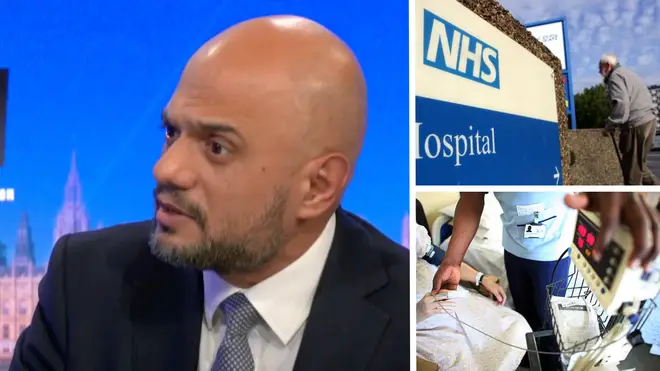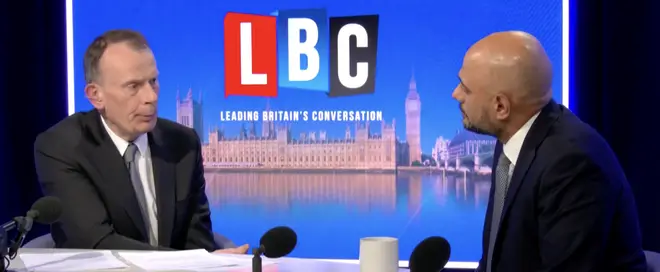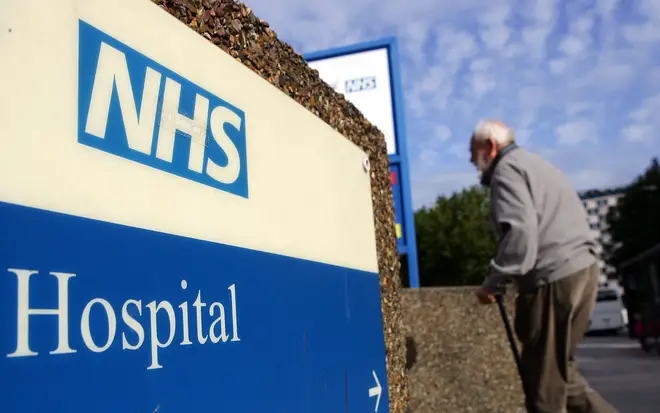
James O'Brien 10am - 1pm
31 January 2023, 19:07 | Updated: 1 February 2023, 10:26

Former health secretary Sajid Javid has warned that the NHS will not survive in "anything like its current form" unless people are charged for it on a means-tested basis.
Speaking on Tonight with Andrew Marr, Mr Javid said that "anyone who's taken a sensible look at the NHS" will see that the "the current state of affairs cannot continue in terms of the funding of it. It's completely unsustainable."
Mr Javid, who was health secretary from June 2021 to July 2022, during the Omicron wave of Covid-19, has come under fire in recent weeks for comments calling for a contributory model to fund the NHS.
Under this model, people would pay for GP and A&E visits on a sliding scale according to their finances, with the people on the lowest incomes still not paying anything.
In his first interview since then, Mr Javid told Andrew that successive governments have used the NHS as a "political football" and the British people are suffering as a result.

Former Health Sec Sajid Javid stands by his proposal that patients should pay for GP and A&E visits
"When I first arrived in the Department of Health as a new Secretary of State, the officials wanted to give me a briefing about public perceptions of the NHS," he said.
"And I remember them telling me, Secretary of State, you need to know that the NHS, most people think it's not working for them. They're not getting what they want out of it.
"Secondly, though, they said, you need to know that, in terms of public esteem, the NHS is the most respected institution after the monarchy.
"So they summarise that as saying, your job is to fix it without touching it."

Mr Javid compared British healthcare outcomes to other European countries that have a contributory model similar to the system he is advocating.
"Europe is our model," he said. "We should look at Europe. I'm not interested in the US model. I've got no interest in that whatsoever. In Europe, many countries, all countries have universal healthcare systems.
"But the one thing that they all have to help fund their health service alongside taxation is a contributory principle.
"Because the essential problem is that demand for healthcare services is surging. It's surging because of demographics. We've got more people that need sort of longer term care with multiple illnesses. We've got lots of new medicines and treatments and of course we all want access to that.

"Also, the burden of disease has changed over the last few decades. More people with obesity and cancer and addictions. And this has led to surge and demand, but capacity has not kept up.
"Why has capacity not kept up? Because virtually the only way we fund the NHS is through general taxation."
Andrew challenged Mr Javid on two issues - whether GPs would start favouring people who are paying, and whether if people were already paying for the NHS, they might go private anyway, leaving a hollowed-out public service.
But Mr Javid said: "What matters at the end of the day is health outcomes," adding that in European countries with similar models health is generally better.
He added: "The people suffering at the end of the day... are the British people. We're not being straightforward and honest about the challenges in the long-term."
Asked what he thought would happen if nothing was done to reform the NHS, Mr Javid said: "I don't think it will survive in anything like its current form even, and I'll explain why... We cannot through general taxation come anywhere close to meeting the demands of people even today.
"But those demands will continue to rise because of the reasons I set out earlier. And already the NHS budget is something like £170 billion a year, it is bigger than the GDP of Greece."
Mr Javid has been criticised by people claiming he wants to dismantle the NHS. And he told Andrew: "The reaction to what I said was disappointing, but not at all surprising. Because my central problem is that we treat the NHS, politicians, collectively all parties, as some kind of political football just to be kicked around.
"The people suffering from that kicking around of the football are the British people. Because we're not being straightforward and honest about the challenges in the long term of providing the health care that people need."